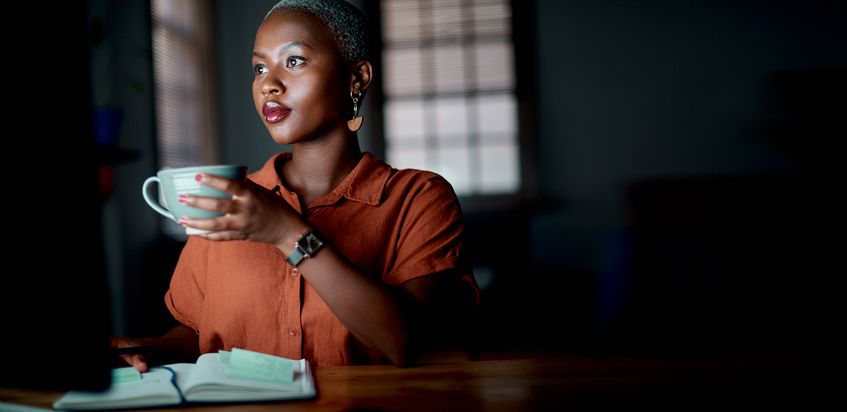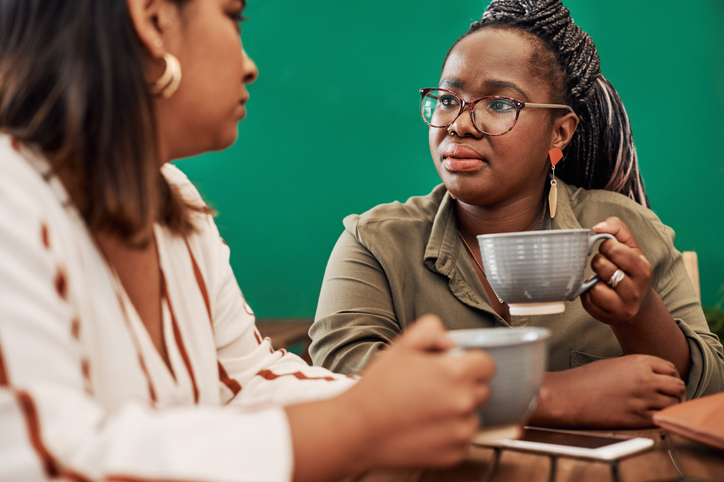The Psychological Benefits Of Writing A Letter - Page 3
Share the post
Share this link via
Or copy link

Source: wagnerokasaki / Getty
When was the last time you wrote a letter? Now, if we want to say something to somebody, it’s so easy to just pick up the phone and call or even video chat in some way so you can see one another’s expressions. For many conversations, that’s a benefit, like when catching up with a loved one. It’s nice to have that real-time interaction and the connection that comes with looking at each other.
Just a couple of centuries ago, if two friends who lived far apart wanted to chat, they had to send a letter through snail mail and wait weeks or months to receive it. Not to mention having to sit down and write out words by hand. But these elements of letter writing which seem like only a downside today have their upsides in some situations – even in a modern world of FaceTime and SnapChat. Sometimes, not having a way to instantly say what you want to say and see the person’s reaction is a good thing. We spoke with psychologist Dr. Ebony, who often works with women on learning how to communicate and ask for what they want, about how writing a letter can be therapeutic.

Source: Dr. Ebony / Dr. Ebony
A letter keeps you safe
Dr. Ebony specializes in working with patients who have been through some sort of trauma. She says that, when working with trauma patients, they look at things through the lens of wanting to remain safe. There is a certain safety in letter writing for trauma patients, but also for anyone who needs to share something difficult, as you can say what you need to say without fear of someone’s instant reaction.

Source: SDI Productions / Getty
Letters aren’t just for others
Love MadameNoire? Get more! Join the MadameNoire Newsletter
We care about your data. See our privacy policy.
Dr. Ebony often has her patients write letters to themselves. She even has them write letters to their younger selves, or to their future selves. She has some write letters to somebody else, but letters they’ll never actually show that person, sometimes because that person is no longer even alive. “A letter can be so important to the healing process to people who felt they otherwise didn’t have a voice,” states Dr. Ebony.

Source: PeopleImages / Getty
A safe place to say “No.”
With the focus being on remaining safe, Dr. Ebony says she sees many patients who have been through some sort of trauma, who now have a hard time saying “No.” She adds that those who struggle to say no can think, “Saying yes keeps me safe because saying no creates resistance and makes me feel unsafe.”

Source: filadendron / Getty
Exploring boundaries
Through letter writing and other exercises, Dr. Ebony says she “Helps people learn to see how they ask for what they want and need, and how to see if something makes them uncomfortable…We don’t have to send a letter. We are stating what we want without being interrupted. Or without the info being invalidated.”

Source: wagnerokasaki / Getty
A letter breaks the silence
“Often when people disclose their trauma, they are met with ‘Why didn’t you say anything earlier?’ or ‘That’s not true’ or ‘Don’t say anything, people will look at our family as flawed,’” states Dr. Ebony. For those who have had this experience, she says, “Writing a letter helps you shed light on something you’ve been told to be silent about.”

Source: Joel Carillet / Getty
Adjust expectations
In some cases, you may write a letter to someone else, and actually give it to that person – perhaps it’s a letter explaining how someone hurt you. In these cases, Dr. Ebony says, “Adjust expectations around what you want the other person to give you. Do the letter writing from a place of what you want, not a place of what you want the other person to do.”

Source: PeopleImages / Getty
Use it to get something off your chest
“Letter writing is so cathartic. It’s so therapeutic,” says Dr. Ebony. “Say it’s a breakup. Not huge trauma, but still traumatic. You want to know why. You want closure. Adjust your expectations around if that person can or will give you that. Look at the letter writing as closure for yourself. That’s how you’re closing that chapter.”

Source: markgoddard / Getty
A letter gives you back control
It’s hard to control a conversation. The other person can cut you off. They can tell you that you’re wrong. They can walk away. “The letter is what you can control,” says Dr. Ebony. “You can’t control whether or not they will respond. The letter is your initiative to closing that chapter.”

Source: F.J. Jimenez / Getty
Don’t wait for a reply
Because writing a letter is about taking the initiative to put an end to things on your terms, it’s important not to expect a response. “Waiting for somebody to return that letter, we can feel rejected, and dig ourselves in a deeper hole because we want people to give us something that they may not have the capacity to give,” explains Dr. Ebony. So write the letter, and release it. That’s your goodbye.

Source: FG Trade / Getty
If they understood, the letter wouldn’t exist
If you are writing a letter to someone who hurt you – perhaps someone who repeatedly hurt you, like a romantic partner or family member – there can be the hope that this letter will finally make them see the error in their ways. But remember that, if they were able to understand that, they likely wouldn’t have done it in the first place. As Dr. Ebony puts it, “Waiting for an answer means we are hanging onto their stuff, that they’re not willing to work on.”
-

She Tried It: Inahsi Naturals Aloe Hibiscus Leave-In Conditioner & Detangler
-

Meet Dominique Fils-Aimé, The Haitian-Canadian Star Redefining Jazz For A New Generation: ‘This is My Vision' [Exclusive]
-

Cooking With Purpose — How Brittney Williams Honors Her Caribbean Roots Through Food
-

Our Health, Our Power: Debunking Myths And Taking Charge This Open Enrollment



